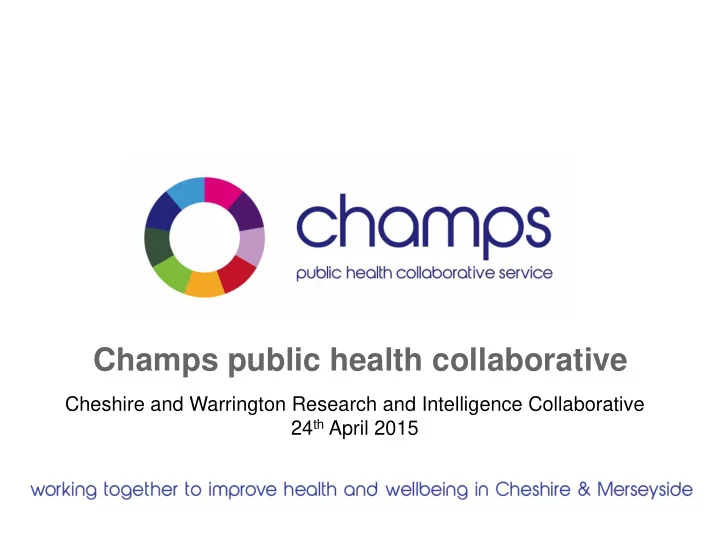

Champs public health collaborative Cheshire and Warrington Research and Intelligence Collaborative 24 th April 2015
Outline • Overview of the public health collaborative – champs. • Overview of Cheshire and Merseyside Intelligence Network • Evidence based decision making in action.
Who is champs ? • Our collaborative is made up of many members and partners • Together we seek to improve the health and wellbeing of local people • A 12 year collaboration, built from an award winning public health network with a national profile • Led by the 9 Cheshire and Merseyside Directors of Public Health as an Executive Board • Reports to the LA CEOs and the designated lead CEO is Margaret Carney (Sefton Council) • Facilitated by a small support team (hosted by Wirral Council)
Our aims 1. System leaders for Public Health 2. Increase impact locally by working together 3. Build a coalition of enthusiastic “upstreamists” 4. Maximise economies of scale and reduce duplication of effort 5. Share specialist public health expertise 6. Innovate and learn together
A successful 10 year collaboration • We worked with the PCT Directors of Commissioning and Finance to generate savings on procedures of low clinical value using the latest evidence (estimated savings £40m) • Our innovate social marketing campaign on alcohol won many industry awards • Our bowel screening campaign saw an increase in uptake in some of the most hard to reach areas by up to 12% • We have a strong track record for generating the latest evidence reviews on a wide range of topics. • We were the first area to ensure every new nurse was trained in brief advice and the promotion of healthy behaviours, a collaboration with academic institutions
Future priorities 2015/16 Prioritisation process with local areas, PHE and NHS England Key Priorities: 1. Mental health with a focus on children and suicide prevention 2. Hypertension 3. Health and regeneration • Continue to collaborate on public health intelligence • Continue to collaboratively commission population level public health programmes to tackle alcohol harm, tobacco, obesity and suicide prevention
Cheshire & Merseyside Public Health Intelligence Network • Manage collaborative intelligence across Cheshire and Merseyside and support priority work areas as identified by the Directors of Public Health • Provide an opportunity for Intelligence Leads to provide support and advice to each other on common issues e.g. Information Governance • Representation from each of the 9 Local Authorities, champs support team and PHE Knowledge & Intelligence Team. • Chaired by Lead Director of Public Health for Intelligence (Matt Ashton), and co-ordinated by Intelligence Lead (Chris Williamson)
Case Study: Procedures of Low Clinical Priority • CM Primary Care Trust Directors of Finance and Commissioning • Maximisation of health benefits based upon financial resources available • Prioritisation of services • Review of over 35 conditions/services e.g. liposuction • Evidence reviews • Recommendations outlining clinical eligibility/criteria for funding approval • Outcome: CM Consistent commissioning policy included in NHS Contracts • Estimated notional £40m saving
Case Study: Procedures of Low Clinical Priority • Evidence reviews for a number of procedures e.g. Varicose veins, cataracts • Resulted in a number of recommendations to support the 12 CCGs across to agree common approach to commissioning across C & M • Core values • Improving health outcomes and service quality • Create efficiencies • Produce cost savings • Influencing policy • Cultivating innovation • Developing workforce • Generating new external resources • Safe and resilient system • Leadership
Commissioned Intelligence Case Study: Homelessness Health Needs Assessment • Liverpool Public Health Observatory were asked to produce a Health Needs Assessment (HNA) for the Liverpool City Region in 2014 • The aim was to form part of local Joint Strategic Needs Assessments (JSNAs) , and to support the Liverpool City Region Single Homelessness Project • The HNA involved reviewing current literature and evidence base, and analysing intelligence from a range of sources. • University also ran a series of focus groups in each Local Authority, bringing together a wide range of stakeholders from Local Authorities, CCGs, Primary Care, Voluntary Organisations
Commissioned Intelligence Case Study: Homelessness Health Needs Assessment • Final report made a series of recommendations for the City Region in addition to specific recommendations for each Local Authority • Examples included: • Reviewing the mental health service pathway in one Local Authority to improve access to services for homeless people • Working with voluntary organisations to ensure direct pathways for homeless people into “Improving Access to Psychological Therapies” (IAPT) services • Ensuring homeless people as considered in the development of strategic plans for End of Life Care • Establishing multi-agency groups (where these do not exist) in order to facilitate greater co-ordination between services and collaboration across sectors
Commissioned Intelligence Case Study: Homelessness Health Needs Assessment • Project received positive feedback : • “… will be invaluable when commissioning new services and/or reconfiguring existing provision ” • “A very useful and comprehensive overview of needs and services, which should provide an example for other regions” • Several comments indicated that the report had formed the basis for closer working between professionals in different sectors. • Report available from: www.champspublichealth.com/intelligence
Thank you Dawn Leicester (dawnleicester@wirral.gov.uk)
Recommend
More recommend